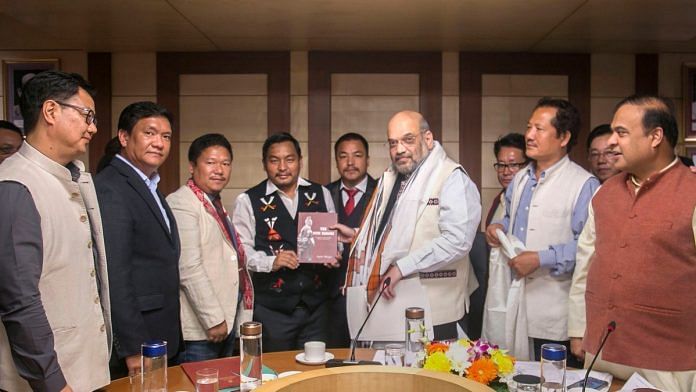New Delhi: People living in India’s north-eastern states have taken to the streets to protest the Citizenship Amendment Bill, which is expected to be introduced in the ongoing winter session of Parliament.
Union Home Minister Amit Shah Saturday held a series of meetings with representatives of student bodies, civil society and political leaders from Assam, Meghalaya and Arunachal Pradesh over the contentious bill.
The chief ministers of the three states, Sarbananda Sonowal, Pema Khandu and Conrad Sangma, were joined by Assam minister Himanta Biswa Sarma and Union Minister of State for Sports Kiren Rijiju, the MP from Arunachal West, to discuss with Shah fears over the implementation of the bill.
The home minister assured them that states and regions under the Inner Line Permit system (ILP), and those granted autonomous administration under the Sixth Schedule of the Constitution, may be shielded from the bill, keeping in mind the concerns of the ethno-cultural population in these states.
On 1 November, the Meghalaya cabinet passed an ordinance, making registration compulsory for visitors who intend to spend more than 24 hours in the state.
This ordinance was an amendment to the existing Meghalaya Residents Safety and Security Act (MRSSA), 2016, which will now require visitors to register themselves under the Inner Line Permit (ILP) system, like in Arunachal Pradesh, Nagaland and Mizoram. The trigger for the ordinance is speculated to be the National Register of Citizens exercise in Assam, which excluded 19 lakh citizens, with fears looming that these people might want to enter Meghalaya. The entry-exit points will be set up along the state’s internal border with Assam.
Also read: Protests erupt against Citizenship Bill in Northeastern states as winter session begins
What is an Inner Line Permit?
An Inner Line Permit is an official travel document required by Indian citizens to visit or stay in states and regions where it is applicable. Arunachal Pradesh, Mizoram and Nagaland (except the city of Dimapur) are currently under the ILP system, and Indian citizens who do not belong to these regions need to have the document to visit or stay.
Outsiders cannot overstay the timeline mentioned in their permits.
Different types of permits are provided — for tourists, for tenants and for other employment purposes, based on the period of stay.
The system is an offshoot of the colonial-era Bengal Eastern Frontier Regulations, 1873. The British had brought in these regulations to protect the commercial interest of the crown by regulating entry and exit of Indian citizens from outside these regions for the purpose of trade.
After Independence, the Government of India chose to keep the ILP to protect the interests of the indigenous tribal communities of the Northeast. The words, “British subjects (Indians)”, in the original regulations were replaced by “Citizen of India”.
Relation between ILP and Citizenship Amendment Bill
The Citizenship Amendment Bill seeks to amend the existing Citizenship Act, 1955 to enable non-Muslim refugees — specifically Hindus, Jains, Sikhs, Buddhists, Parsis and Christians — from Pakistan, Bangladesh and Afghanistan to obtain Indian citizenship.
Initially tabled in the Lok Sabha in 2016, the bill was reviewed by the Joint Parliamentary Committee (JPC), and then passed by the Lower House in January 2019. However, due to massive protests against the bill, it couldn’t be introduced in the Rajya Sabha.
Now, if the bill is passed and implemented, with the ILP system also in place, it would mean the refugees who are granted citizenship under the new act will not be permitted to settle in Arunachal Pradesh, Nagaland and Mizoram.
However, nothing related to the Citizenship Amendment Bill is clearly stated under Meghalaya’s new law, so it is unclear if the ILP restrictions will be applicable to that state.
Also read: Modi govt’s Citizenship Amendment Bill silent on rights of Gorkhas, Koch Rajbongshis & Bodos
The case of Manipur and other states
The majority Meitei community of Manipur has continuously demanded the implementation of ILP in the state. The Manipur People’s Protection Bill, 2018 seeks to regulate the inflow of outsiders from other Indian states and defines “Manipuris” and “non-Manipuris”.
The bill was unanimously passed in the state assembly and now awaits the President’s approval.
The North East Student’s Union (NESO), an umbrella organisation for students’ unions, had demanded the implementation of ILP in all states of the region last month.
Assam and Tripura, which share the longest border with Bangladesh in the region, do not have the ILP system in place. The percentage of tribals in Assam is comparatively lower than its neighbouring states, according to the 2011 Census. The tribal population in Assam and Tripura is protected by the Sixth Schedule of the Constitution, which may be exempted from the Citizenship Amendment Bill.
Further, a series of discussions are being held by a high-level committee constituted by the Ministry of Home Affairs (MHA) to define “Assamese” under Clause 6 of the Assam Accord, to protect the identity and ethnicity of the non-tribal Assamese population.
Also read: Why Meghalaya’s non-tribals think new visitor permit rule is ‘organised’ way to dispel them




Independent of the CAB – which I do not support – the concerned states might wish to do a cost benefit analysis of the Inner Line Permit system. Difficult to see ASEAN style development coming to this region.